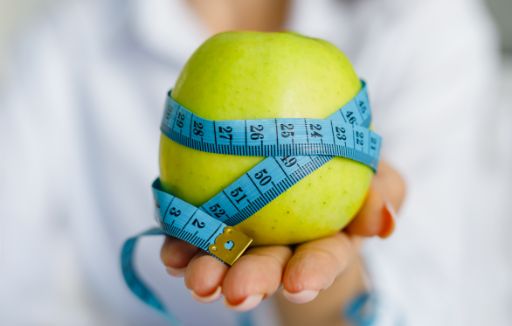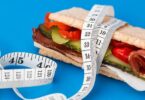Understanding calories and how they work is crucial for anyone looking to lose weight, build muscle, or simply maintain a healthy lifestyle. This article aims to provide an in-depth look at what a calorie deficit is, how you can achieve it, and how to track your calories effectively, even when dining out.
How Do I Know If I’m in a Calorie Deficit ?
The Basics: Understanding Calories In and Calories Out
A calorie deficit occurs when you consume fewer calories than your body needs to maintain its current weight. This ‘gap’ forces the body to utilize stored fats as a source of energy, resulting in weight loss. The simple formula to understand here is:
Calorie Deficit = Calories Consumed – Calories Burned
Signs You’re in a Calorie Deficit
A calorie deficit is when you consume fewer calories than you burn in a day. It can help you lose weight, but it can also have some negative effects on your health and well-being if it is too large or sustained for a long time. Some of the signs and symptoms that you are not eating enough calories are:

- Low energy levels: You may feel tired, sluggish, or weak most of the time. Your body needs calories to fuel your basic functions and movements. If you don’t eat enough, you may not have enough energy to perform your daily activities or exercise
- Hair loss: You may notice more hair falling out or thinning. Your hair needs nutrients like protein, iron, biotin, and zinc to grow and stay healthy. If you don’t eat enough calories or these nutrients, your hair may suffer
- Constant hunger: You may feel hungry all the time, even after eating. Your body sends hunger signals when it needs more calories or nutrients. If you ignore these signals or restrict your intake too much, you may experience cravings, binge eating, or overeating
- Infertility issues: You may have irregular periods, low libido, or difficulty conceiving. Your reproductive system needs calories and hormones to function properly. If you don’t eat enough, your hormone levels may drop and affect your fertility
- Sleep issues: You may have trouble falling asleep or staying asleep. Your body needs calories to regulate your circadian rhythm and produce melatonin, a hormone that helps you sleep. If you don’t eat enough, your sleep quality may suffer
These are some of the common signs that indicate you are not eating enough calories. However, they may also be caused by other factors, such as stress, illness, medication, or genetics. Therefore, it is important to consult your doctor before making any changes to your diet or lifestyle. They can help you determine your calorie needs and advise you on how to create a healthy and sustainable calorie deficit that suits your goals and preferences.
The Implications of a 700 Calorie Deficit
A 700 calorie deficit is when you consume 700 calories less than you burn in a day. It can help you lose weight faster than a smaller deficit, but it also has some pros and cons that you should consider before trying it. Here are some of the implications of a 700 calorie deficit:

- Pros: A 700 calorie deficit can help you lose about 1.4 pounds (0.6 kg) per week, assuming that your maintenance calories are around 2,000 per day. This is a healthy and realistic rate of weight loss that can help you achieve your goals sooner than a smaller deficit. A 700 calorie deficit can also improve your health by reducing your risk of obesity-related diseases, such as diabetes, heart disease, and some cancers.
- Cons: A 700 calorie deficit can also have some negative effects on your health and well-being if it is not done properly or for too long. Some of the possible drawbacks are:
- Low energy levels: You may feel tired, sluggish, or weak most of the time. Your body needs calories to fuel your basic functions and movements. If you don’t eat enough, you may not have enough energy to perform your daily activities or exercise.
- Nutrient deficiencies: You may not get enough vitamins, minerals, and other nutrients that your body needs to function optimally. This can affect your immune system, skin, hair, nails, bones, and organs. To prevent this, you should eat a balanced and varied diet that includes plenty of fruits, vegetables, whole grains, lean proteins, healthy fats, and water.
- Muscle loss: You may lose some muscle mass along with fat. Muscle is important for your metabolism, strength, and body composition. To preserve your muscle mass, you should eat enough protein (at least 0.8 grams per kilogram of body weight per day), do resistance training at least twice a week, and avoid very low-calorie diets (below 1,200 calories per day for women and 1,500 calories per day for men).
- Hormonal imbalances: You may experience changes in your hormones that affect your mood, appetite, sleep, libido, and fertility. For example, you may have lower levels of leptin (a hormone that regulates hunger and satiety), higher levels of ghrelin (a hormone that stimulates hunger), lower levels of thyroid hormones (which regulate your metabolism), lower levels of testosterone (which affects muscle growth and sexual function), and lower levels of estrogen (which affects menstrual cycles and bone health).
- Adaptive thermogenesis: You may experience a decrease in your metabolic rate as your body adapts to the lower calorie intake. This means that you burn fewer calories at rest and during activity than before. This can make weight loss harder and weight regain easier if you resume your normal eating habits .
As you can see, a 700 calorie deficit has both advantages and disadvantages. It is important to weigh the pros and cons carefully before deciding to try it. You should also consult your doctor before making any changes to your diet or lifestyle. They can help you determine your calorie needs and advise you on how to create a healthy and sustainable calorie deficit that suits your goals and preferences.
How an 800 Calorie Deficit Per Day Works
An 800 calorie deficit is when you consume 800 calories less than you burn in a day. It can help you lose weight faster than a smaller deficit, but it also has some pros and cons that you should consider before trying it. Here are some of the implications of an 800 calorie deficit :

- Pros: An 800 calorie deficit can help you lose about 1.6 pounds (0.7 kg) per week, assuming that your maintenance calories are around 2,000 per day. This is a healthy and realistic rate of weight loss that can help you achieve your goals sooner than a smaller deficit. An 800 calorie deficit can also improve your health by reducing your risk of obesity-related diseases, such as diabetes, heart disease, and some cancers.
- Cons: An 800 calorie deficit can also have some negative effects on your health and well-being if it is not done properly or for too long. Some of the possible drawbacks are similar to those of a 700 calorie defici .
Extra Considerations
Workout Performance : With an 800 calorie deficit, maintaining your usual exercise performance may be difficult.
Hormonal Changes: More substantial deficits can impact hormones related to hunger and metabolism.
Calorie Deficit vs. Keto: The Showdown
The ketogenic diet (keto) is a low-carb, high-fat diet that aims to shift your body’s primary fuel source from carbs to fats. This induces a state of ketosis, where the body burns fat for fuel.

- Calorie deficit: This is when you consume fewer calories than you burn in a day, creating a negative energy balance. This can lead to weight loss regardless of the type of food you eat, as long as you stay within your calorie limit. However, this may also cause hunger, cravings, nutrient deficiencies, muscle loss, hormonal imbalances, and adaptive thermogenesis if the deficit is too large or prolonged. To prevent these negative effects, you should eat a balanced and varied diet that includes all food groups, especially fruits, vegetables, whole grains, lean proteins, healthy fats, and water. You should also aim for a moderate deficit of around 500 calories per day, which can help you lose about 1 pound (0.45 kg) per week.
- Keto: This is when you restrict carbohydrates to less than 50 grams per day, forcing your body to enter ketosis. This is a metabolic state where your body burns fat instead of glucose for energy, producing ketones. This can lead to weight loss by suppressing appetite, boosting metabolism, and reducing insulin levels. However, this may also cause side effects such as keto flu, bad breath, constipation, low blood pressure, kidney stones, and nutrient deficiencies if the diet is not well-planned or followed correctly . To prevent these side effects, you should eat enough fiber, electrolytes, vitamins, and minerals from low-carb vegetables, nuts, seeds, dairy products, and supplements. You should also monitor your ketone levels and blood sugar levels regularly to ensure you are in ketosis and not harming your health.
How Long Should I Be in a Calorie Deficit?

The answer to how long you should be in a calorie deficit depends on several factors, such as your current weight, body fat percentage, goal weight, goal body fat percentage, and the size of your calorie deficit. Generally speaking, the larger the calorie deficit, the faster you will lose weight, but also the harder it will be to maintain and the more likely you will experience negative effects such as hunger, fatigue, nutrient deficiencies, muscle loss, hormonal imbalances, and metabolic slowdown.
Therefore, it is recommended to create a moderate calorie deficit of around 500 calories per day, which can help you lose about 1 pound (0.45 kg) per week. This is a healthy and realistic rate of weight loss that can help you achieve your goals without compromising your health or well-being. To find out how many calories you need to eat per day to create a 500 calorie deficit, you can use an online calculator or a fitness tracker that estimates your maintenance calories based on your age, height, weight, activity level, and body composition. Then, you can subtract 500 calories from that number to get your daily calorie target.
To estimate how long you should be in a calorie deficit for, you can use this formula:
- Divide your goal weight loss (in pounds) by 1. This will give you the number of weeks you need to be in a 500 calorie deficit for.
- Multiply the number of weeks by 7. This will give you the number of days you need to be in a 500 calorie deficit for.
For example, if you want to lose 20 pounds (9 kg), you can use this formula:
- 20 / 1 = 20 weeks
- 20 x 7 = 140 days
This means that you need to be in a 500 calorie deficit for about 20 weeks or 140 days to lose 20 pounds. However, this is only an approximation and may vary depending on your individual factors and progress. You may lose weight faster or slower than expected depending on your metabolism, hormones, water retention, muscle mass, and adherence to your diet and exercise plan. Therefore, it is important to monitor your weight and body fat percentage regularly and adjust your calorie intake and expenditure accordingly.
Calorie Deficit vs Calorie Surplus: What’s the Difference?
The difference between calorie deficit and calorie surplus is the effect they have on your body weight, composition, and health. A calorie deficit means eating fewer calories than you burn in a day, while a calorie surplus means eating more calories than you need in a day. Here are some of the main differences between them:

- Weight loss or gain: A calorie deficit will result in weight loss, as your body will use its stored fat and muscle for energy. A calorie surplus will result in weight gain, as your body will store the excess calories as fat, muscle, or glycogen.
- Metabolism: A calorie deficit will lower your metabolic rate, as your body will adapt to the lower energy intake and try to conserve energy. A calorie surplus will increase your metabolic rate, as your body will have to work harder to process the extra calories.
- Hormones: A calorie deficit will affect your hormones that regulate hunger, satiety, mood, sleep, libido, and fertility. For example, you may have lower levels of leptin (a hormone that signals fullness), higher levels of ghrelin (a hormone that stimulates appetite), lower levels of thyroid hormones (which regulate metabolism), lower levels of testosterone (which affects muscle growth and sexual function), and lower levels of estrogen (which affects menstrual cycles and bone health). A calorie surplus will also affect your hormones, but in the opposite direction. For example, you may have higher levels of leptin, lower levels of ghrelin, higher levels of thyroid hormones, higher levels of testosterone, and higher levels of estrogen.
- Performance: A calorie deficit will impair your performance in physical and mental activities, as you will have less energy and focus. A calorie surplus will enhance your performance in physical and mental activities, as you will have more energy and focus.
- Health: A calorie deficit can improve your health by reducing your risk of obesity-related diseases, such as diabetes, heart disease, and some cancers. However, if the deficit is too large or prolonged, it can also harm your health by causing nutrient deficiencies, muscle loss, hormonal imbalances, and metabolic slowdown. A calorie surplus can also improve your health by increasing your muscle mass and strength, which can protect your bones and joints. However, if the surplus is too large or prolonged, it can also harm your health by causing excess fat gain, insulin resistance, inflammation, and increased risk of obesity-related diseases.
As you can see, calorie deficit and calorie surplus have both advantages and disadvantages. The choice between them depends on your personal goals and preferences. You should consult your doctor before making any changes to your diet or lifestyle. They can help you determine your calorie needs and advise you on how to create a healthy and sustainable calorie deficit or surplus that suits your goals and preferences.
How to Track Calories When Eating Out
Tracking calories when eating out can be challenging, but not impossible. Here are some tips to help you estimate your calorie intake and stay within your goals:

- Check the restaurant’s website or app for nutritional information. Some restaurants provide the calorie and macronutrient content of their menu items online, which can make tracking easier. You can also use a food calculator like WebMD’s Food Calculator to look up the calories, fat, carbs, and protein of common foods and drinks.
- Use a visual guide to estimate portion sizes. If the restaurant does not provide nutritional information, you can use your hand or common objects to estimate how much food you are eating. For example, a fist is about one cup of rice or pasta, a palm is about three ounces of meat or fish, a thumb is about one tablespoon of oil or butter, and a deck of cards is about one ounce of cheese.
- Round up your estimates by 20%. Most restaurants use more oil, butter, cream, cheese, and sugar than you would at home, which can add a lot of calories to your meal. To account for this, you should round up your estimates by 20% to be on the safe side. For example, if you think your meal has 500 calories, you should log it as 600 calories.
- Choose lower-calorie options when possible. You can save calories by making smart choices when eating out. For example, you can order grilled, baked, or steamed dishes instead of fried or sautéed ones; ask for sauces and dressings on the side and use them sparingly; skip the bread basket, appetizers, and desserts; and drink water, unsweetened tea, or diet soda instead of regular soda, juice, or alcohol.
- Enjoy your meal and don’t stress too much. Eating out is meant to be a fun and social experience, not a source of anxiety. As long as you track your calories as best as you can and don’t do it too often, one meal out will not ruin your progress. Remember that consistency is more important than perfection when it comes to reaching your goals.
Notion Calorie Tracker : A Useful Tool

Notion Calorie Tracker is a versatile productivity app that can be customized to track calories. With templates and databases, you can log your meals, calculate your caloric intake, and monitor your macros easily.
In summary, understanding and tracking your calories can significantly impact your health and fitness journey. A calorie deficit is a straightforward concept, but its effective application involves careful planning and a bit of science. Always consult with a healthcare provider before making significant changes to your diet or exercise regimen.







